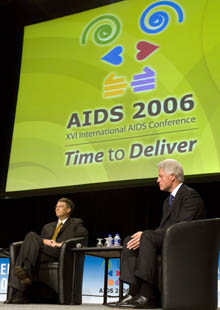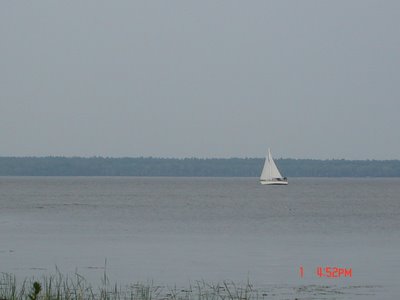Edgewater Views
Saturday, November 04, 2006
Sunday, September 17, 2006
Tuesday, September 05, 2006
The Iggster is being... BORN AGAIN... today after many screwups - STAY TUNED.
It seems that Michael Don't Call Me Iggy Ignatieff will be relaunching his campaign today. The Globe and Mail reported yesterday that "his event is to take place at the Ontario Heritage Centre in downtown Toronto and many of his caucus supporters — he has close to 45 senators and MPs on his team — are to be with him for the relaunch".
I wonder what these ambitious Senators and MPs are thinking now. Iggy had many endorsements on week one of the leadership campaign (before there were other candidates) and they self-proclaimed Michael at the outset as the frontrunner - it seems to satisfy their own political ambitions by latching to someone they thought would be a STAR. At the time it may have looked that way.? Now, it appears these endorsements may have been pre-mature and he may a ROOKIE after all.
I wonder what they are thinking now?
With dozens of mistakes, Ignatieff's title as "frontrunner" has been systematically replaced recently in the news with "Rookie MP". Check it out. Though the relaunch may postpone the retreat of many party executives and officials who have been with him since the beginning, it is almost admitting that the campaign until now has been a failure.
Keep on Igging.
Thursday, August 31, 2006
Harper announces that border guards will be armed: more USA pandering or legitimate threat
 It seems that the next phase of conservatism in Canada has been set motion in with Stephen Harper's announcement today that border patrol guards will be armed. Although the guard's unions have been asking for this for some time, I suspect that this represents another nail in the coffin for the Canadian way and another example Canada shadowing the United States' enforcement-based policies, especially when it comes to homeland security.
It seems that the next phase of conservatism in Canada has been set motion in with Stephen Harper's announcement today that border patrol guards will be armed. Although the guard's unions have been asking for this for some time, I suspect that this represents another nail in the coffin for the Canadian way and another example Canada shadowing the United States' enforcement-based policies, especially when it comes to homeland security.Furthermore, this may be something that the Conservatives have had to agree to in the remote chance that Washington will postpone the new border crossing and identification rules by the Western Hemisphere Travel Initiative (WHTI). Currently, this is expected to be implemented in two phases -- for entries via sea and air by January 2007 and for land-border crossings by January 2008. This puts at risk much cross border trade and makes Canada particularily vulnerable economically. Reportedly, the Conservatives have been lobbying Washington to postpone WHTI with little success so far.
What if this change does not result in any movement by Washington? Will Harper continue to make changes in Canada he thinks George Bush will like in the event that he will "throw us a bone". I am not convinced this is the best way to negotiate with Washington. I am not convinced that the systematic dismantling of aspects of Canada that distinguish us from our neighbours to the South is not the best way to motivate Canadians to vote Conservative in the future unless we are at the same time convinced there is an imminent threat. Watch out and be cautious about reasons that could support and legitimise the further conservatism of Canada - which is the only way I can see Canadians buying in to liberties traditionally valued by us collectively.
Sunday, August 27, 2006
Greens choose May for leader, electoral breakthrough: whose votes are at risk?
According to the Toronto Star, the new leader has had a high profile career as a champion of multiple environmental causes. She also worked for the Progressive Conservatives under Brian Mulroney, and made a splash in the late 1980s when she paid tribute to Mulroney as the “greenest” prime minister at an award dinner in Ottawa attended by Harper. May met with Rona Ambrose many months ago, before deciding to run for the Green Party and advised Ambrose to follow the example of Mulroney’s green plan.
She was chosen for her clout, influence, and for an electoral breakthrough for the Greens more so than policy. The Star suggests that the two frontrunners had almost no policy differences, except on Nafta: “the race came down to a question about the best winning formula for the Greens”.
At whose expense do the Greens expect to have an electoral breakthrough? May argues that Nafta “rachet(s) down on labour rights and the environment in Canada”. She also is critical of how the policies of the US president imperil” us here” in Canada and how Harper’s Green Plan Two is a “made in Houston” not in Canada plan.
The message here is that the Greens under May will seek to exercise their clout on environmental issues as a voice of opposition, but may not be as ideologically different from the Conservatives as one might at first think, apart from issues of nationalism.
The Greens will try to chip away at support from all other parties by making the environment a “ballot box” question for “swing voters”. That includes going after some “swing support” that ended up with the CPC in the last election - support that had originated with voters who had previously supported the Liberals or the NDP. The Green membership have entrusted May to go after this vote and in so doing seemingly confusing the traditional and linear “Left-Right”.
This theme seems to be recurring, as I wrote on August 19th the following about the CAW/NDP split:
“What does this mean for the use of linear terms in describing ideology such as "left" and right" in Canadian politics? Go back to Poli 101 to fully consider whether in Canada until now these terms have been more about political spin, control and stigma than about an accurate way of analyzing ideological preferences.In light of political theories that suggest that the commonalities between extreme fascism and socialism are closer than the linear definition of the political spectrum can allow, this split between the CAW and the NDP might be proof that this linear model is too simplistic.”
Has the landscape of Canadian politics changed forever … stay tuned.
Monday, August 21, 2006
Saturday, August 19, 2006
Finally! Real proof the earth is actually 'round': CAW / NDP split up
Is the CAW / NDP divorce proof that earth is round - ahem - I mean that political spectrum is not linear and is more like horseshoe or something like that?
We all recall Canadian autoworkers President Buzz Hargrove's endorsement of the Liberals during the last election, showing perhaps that the relationship between the CAW and the NDP was strained. The NDP had apparently suspended his membership. The Toronto Star reports today that Buzz this past week took his union with him and officially ended the 45 year relationship.
This partnership had changed Canada's political landscape both provincially and federally for over a generation, as the autoworkers were both militant and overtly political. Their collective interests as such have been on the agenda - they were arguably too successful - to the point that their relationship with the NDP had to end.
Strong representation, escalating salaries and benefits for traditionally "blue collar" workers has clouded differences between blue collar/white collar or working class/professional class Canadians. The Star suggests that well paid unionists making $60,000 to $80,000 might not want to tax the rich anymore more because of what they have become more than what they have been. NDP party president Adam Giambrone says that people see themselves as "middle class" and don't like to see themselves as "working class" in Canada anymore.
Does this mean autoworkers are now more like Liberals or Conservatives? Is the union relevant and possibly a parodox when one travels politically "right of centre"?
What does this mean for the use of linear terms in describing ideology such as "left" and right" in Canadian politics? Go back to Poli 101 to fully consider whether in Canada until now these terms have been more about political spin, control and stigma than about an accurate way of analyzing ideological preferences.
In light of political theories that suggest that the commonalities between extreme fascism and socialism are closer than the linear definition of the political spectrum can allow, this split between the CAW and the NDP might be proof that this linear model is too simplistic.
This begs the question: can successful union representation ever be anything but a temporary response to be used to create labour fairness and equilibrium? Would moderately successful unions be more everlasting? How would union leadership then separate their responsibilities to their constituents’ collective interest from their own “professional preservation” as individuals? Are the same benevolent approaches demanded by Plato in the conditions he sets out for successful democracies applicable also to labour unions?
To answer these questions we could consult C. Wright Mills and his theories on “elites” to consider what conditions can set in motion ideological shifts over time and the morphing of boundaries that have marked and defined ideologies at specific points in history.
How will the CAW/NDP split redefine political preferences and ideological definitions in Canada? Another great question! Tune in again in 20 years.
Tuesday, August 15, 2006
Boisclair wins in Pointe-Aux-Trembles: PQ leader off to Quebec City

I don't normally report the news but for those outside of Quebec you may not have heard that Andre Boisclair, the leader of the Parti Quebecois won a seat in the National Assembly last night and will sit as an MLA. The Liberals under Jean Charest did not run anyone against him. He won with 70% of the vote.
This was one of two by-elections won by the Parti Quebecois last night. The other was on the South Shore of Montreal in a PQ stronghold; the PQ won that one with 44% of the vote.
While the PQ might want to promote these victories as indicators that Quebec is poised to separate the next time there is a chance, the current polls suggest otherwise. The same is true with respect to the likelihood that the Quebec Liberals under Premier Jean Charest will not maintain office in the next provincial election, which reportedly will not happen for another year or so.
Unless something dramatic changes, the status quo will prevail. Charest, who is acting more like a Conservative with his public and infrastructural support for Stephen Harper, has run with textbook "bad news" then "good news" agenda. Very unpopular amongst Quebecers during his first two years in office, Charest has recently taken and maintained a commanding lead in the polls, in part by making statements mitigating the PQ's message internationally, such as those in France recently stating that Quebec has the economic wherewithal to make it on its own. This seems to have diffused some "soft nationalist" support that my otherwise have gone to the PQ. However, support remains for the Liberals perhaps as a result of such statements and perhaps due to the controversial Boisclair at the helm.
Let's see if another crisis changes this current landscape in Quebec. The PQ sure hope so...
Monday, August 14, 2006
The Bills are there... Where is Harper?

Apparently, Stephen Harper has scheduling problems that are preventing him from attending the AIDS Conference that opened today in Toronto. The Conference co-chair Dr. Mark Wainberg said he was disappointed by the prime minister's decision to turn down an invitation to open the conference and stated publicly that he thinks Harper is making a mistake in not attending.
Though more diplomatic, this is a message similar to the one put forward by Canadian musician KD Lang last two weeks ago when Harper failed to show up at the 1st Outgames in Montreal. Lang told reporters that Harper's absence promoted intolerance. In making these comments, Lang may have been linking Harper's convenient absence to his position on gay marriage and the implicit message that the event attended mostly by homosexuals from around the world lacked the legitimacy to deliver the Prime Minister of the host country.
Because AIDS is a disease that affects many groups worldwide, it is a bit of a stretch to think that Harper would avoid the conference because of Steve’s “homophobia” as implied by Lang. However, is it possible that he has considered whether his "family values type" supporters would see his presence at the AIDS Conference giving a similar legitimacy to a demographic group historically affected by AIDS that they don't condone at best and reject at worst? Was Harper worried about a possible collective ignorance of his core support in that many may not yet know that AIDS is not a “gay” disease?
Nevertheless, I am pleased that persons with global profile and much respect such as Bill Gates and Bill Clinton chose to attend instead, giving credibility to this cause. Stephen Harper should be embarrassed to not have contributed the positive message. Although Canadians can be proud to host such an important event for the future of the world in a way consistent with Canada's traditional role in the world, it is embarrassing that our own mini-Bush AKA "the Shrub” is dodging it and pretending that he absolutely needs to be somewhere else all week.
Saturday, August 12, 2006
If you Can’t beat ‘em, join ‘em: Emerson and Khan two peas in a pod.
If you Can’t beat ‘em, join ‘em may have been what was going through David Emerson’s mind when he defected to the Tories the week after the Liberals were forced from power. How is Mississauga Liberal MP Wajid Khan’s acceptance of Stephen Harper’s appointment as a special adviser on the Middle East and South Asia that much different?
Although we don’t know what took place behind closed doors between the Tories and Emerson when Harper was planning his cabinet, Khan apparently offered his services and Harper accepted, in spite of the criticism of Khan’s by his fellow Liberal MPs as reported today by the CBC. I suppose this is one way for Harper to silence the Liberal Defence Critic and an opposition movement that has helped to create a recent drop in popular support for the Tories as measured by recent polls. Such strong opposition made certain that Canadians noticed how Harper has “dropped the ball” on foreign policy. Where are we now?
For ambitious Liberals, this trend at least provides incentives for them to provide the government with strong opposition - perhaps an appointment will emerge... Those who resist the temptation of such “carrots” should be commended on their commitment to their party, their constituents, and to their party’s ideology.
Perhaps Kahn rationalizes the acceptance of this appointment on the basis of his ability to “positively contribute”. Nevertheless, in so doing, he is also ignoring the extent to which this move renders the opposition to Harper’s foreign policy less effective at a critical time.
What ever happened to “biding one’s time”? Or, is this a signal that Khan truly believes that the Liberals will have to pursue a “two election” strategy for replacing the Tories in office?
This is pretty weak if you ask me.
Friday, August 11, 2006
Is Rae "flip flopping" on the Middle East?
In comparing Bob Rae's statement of July 17, 2006 about the situation in the Middle East with his statements published in today's National Post, I can't help but question whether he is "flip flopping" or simply effectively positioning and distinguishing himself far away from both Harper and Ignatieff.
In July, Bob focused on Israel's right to defend itself and Canada's obligation to deploy peacekeepers on the border between Israel and Lebanon. Apart from expressing a 'deep loss' about the deaths of innocent civilians in Lebanon, Israel and Gaza, his focus was more about his view that Canada's further efforts "need to focus on the refusal of both Hezbollah and Hamas to recognize Israel's right to exist".
With Stephen Harper under fire still, as further evidenced by the 15,000 person protest in Montreal last weekend, and Michael Ignatieff's odd comments about "not losing sleep..." about the loss of children's lives when Israel bombed Qana, Rae seems today to be promoting a view that Canada should be "neutral".
The political expediency of such a neutral opinion on the Middle East has only become evident since Canadians have shown their collective discomfort with Stephen Harper's approach to this crisis.
I would like to know three things: 1. What did Bob think would sell politically in July? 2. What does he think is politically prudent now? 3. What does Bob really think about this issue?
If anyone knows for sure, please advise.
Tuesday, August 08, 2006
Did Rae and Ignatieff ignore the Next Face Challenge?
I am disappointed that Bob Rae or Michael Ignatieff were not held accountable for ignoring the "Next Face" blog's challenge in June for leading Leadership candidates. I thought this exercise was potentially an excellent way for bloggers to compare prospective leaders on a common set of questions.
Amongst the leaders, Stephane Dion and Ken Dryden took the challenge right off the bat. Following the publication of Stephane Dion's interview, Next Face published on June 23 the following challenge: "We would like to ask 4 questions of each of the remaining 3 candidates considered by Next Face to be at the forefront for this leadership race, Mr. Dryden, Mr. Ignatieff, and Mr. Rae."
Within minutes the Team Dryden responded to the Next Face Challenge. Mr. Dryden received the full praise of the Next Face interviewer and Mr. Dryden became instantly favorite with Next Face. The last odds published by Next Face were on June 22, 2006:
Bob Rae: 4 : 1
Ken Dryden: 5 : 1
Michael Ignatieff: 5 : 1
Stephane Dion: 6 : 1
I have been waiting to compare the answers of Mr. Rae and Mr. Ignatieff, although I have not heard much of anything from either since the July 4th new member cutoff. Both Dion and Dryden have at least announced policy and have made regular public appearances. Do either Rae or Ignatieff have plans to respond to the Next Face Challenge or should I just move on?
Thursday, August 03, 2006
Are Tory insiders pleased with Harper's recent performance?
Rumour has it that some senior "Tories" i.e. particularly those "Tories" who previously backed the wing of the party that claimed to be "progressive" (the originals) are not very pleased with Harper's recent fumbles. Since being elected, there had been some success by the strategists in making Canadians “less afraid” of Steve than before. However, with Canadians musing about how closely Harper's Middle East position follows the lead of US foreign policy, this is not where the Conservative Party wants to be this early into their Minority, especially since this is what Canadians were warned this would happen during the election campaign.
Furthermore, the bad press he has been getting about him supporting intolerance by conveniently "missing" the Outgames in Montreal may have lost him the support of moderately tolerant Canadians who recently sought change in the last election.
This discontent is both expected and surprising. It is surprising since it has been hard for all parties to mount an effective opposition in Parliament given the lack of readiness of the Liberal Party. However, it is expected since Canadians typically tolerate only moderate amounts of belligerence from their leaders.
With new statistics today showing the Tories with a very slim popularity lead over the Liberals and a loss to the Liberals in Quebec, I wonder how the Progressives feel tonight. It seems Harper may have peaked in his first six months in Office in spite of having had a free ride 'til now.
Monday, July 31, 2006
The Supreme Court and Child support: Another "one hit wonder"
Although I am not surprised that the Supreme Court of Canada today upheld the recent phenomenon of provincial family courts to make child support even more enforceable, I am disappointed. Now "retroactive child support" is the law and support paying parents - i.e. parents who have their children less than 40% of the time - are now officially responsible to pay more as their income goes up and retroactively if it is not reported. Unfortunately, there is a lack of federal policy on "parent child access", which makes this particular Supreme Court ruling magnify the complete absence of policy with respect to "parent/children access". This absence of policy on access becomes a gender issue because gender is still a factor in the awarding of custody by provincial courts.
With all other things being equal, gender is the single most important factor in the determining of child custody by provincial court judges who preside over the administration of the federal Divorce Act. This is in spite of the fact that Canada's Charter of Rights and Freedoms has protected since 1982 gender equality and has rendered inappropriate the expired patriarchal principles of the "tender year’s doctrine" that protected the "special relationship between mothers and their children". The appropriateness of "tender year’s doctrine" wore off with the entry of women at equal levels into the workforce, the frequency with which men care for their children while their wives work, the discovery that special relationships also exist between children and their fathers.
How can it be? The statement "best interest of the child" trumps any obligations to uphold gender equality according to the Charter in the awarding of child custody because it can become "spin" that makes the best interest of the child congruent with awarding custody to the mother. This typically means "standard visitation", which means that the mother would have the child(ren) 75 % of the time and the father would visit 25% of the time of every second weekend and Wednesday night. This tendency for there to be a "gender bias in sheep clothing" tainting the equitable administration of custody by gender has an exponential negative impact on men when it comes to the two priorities of the Divorce Act: child support and access.
Child Support: this is because child support is due to be paid by the father when the children live with the mother more than 60% of the time and with the father less than 40% of the time. Child support is "rarely" paid by women to men in those cases when men are awarded access because of a common fear by men in that position to enforce it for the perceived fragility of male custody of children.
Therefore, standard visitation preserves the patriarchy of money flowing from fathers to mothers in the form of child support regardless of the respective incomes of the parents involved or the extent to which there are second families and other children involved. Second families come second is a further message sent by this Supreme Court ruling. The irony is that second families are comprised of women and female children, who could be starving and without protection if dad falls behind his child support obligations to his first family. This is not a gender issue - it is about who benefits from lopsided family policy and who does not.
Access: because men typically do not have custody, they are the ones who have the most need for policy on the Divorce Act's other priority - "child access". Unlike child support, which has strict enforcement in place to motivate father's to pay child support to their children's mother, a principle strengthened by today's ruling, there is no non-litigious remedy to help parents who are denied access to their children to enforce that access. Instead, it can take years and tens of thousands of dollars via the courts to remedy a fairly common injustice, whether is it called "malicious mother's syndrome" or "parental alienation syndrome". Most offenses of this type are never proven because the jurisdiction is the family court and fathers would have to pay after tax dollars to retain lawyers to do a "private prosecution". Few have the financial wherewithal, especially after they pay their child support, which is also set in net dollars.
Ironically, the failure of the policy on custody to protect against gender bias creates as a result tainted child support policy that is also gender biased and preserves the flow of monies from men to women. The same is true with respect to access which is seemingly a lesser priority because of a lack of policy yet and delays that are attributable to the powerful lobbies that promote the status quo.
The Supreme Court of Canada should not be setting the policy agenda for Canada’s family policy because the government is too afraid of the lobbies who profess that “changes to the Divorce Act hurt women and children” to pass bill C-22. As such, the gap that exists between where we are now and equitable family policy widened a little bit more today with this ruling when compared to the absence of any clear message on the importance of access as a priority of the Divorce Act.
Tuesday, July 18, 2006
on hitting one's peak too quickly....
Depending upon when one considers the Liberal leadership race to have begun, we are only part way through the race, given that the election was in late January and that it took some time for the 11 declared candidates to throw their hats into the ring. There have been two debates so far and we are past the deadline for signing up members. Most notable Liberals have already declared who they are supporting. Who then is winning and how do we know that? Iggy? Kennedy? Dion? Rae? Someone else the media is not talking about in this way yet???
With each of these candidates there is a potential problem that could emerge between now and convention, as some argue that none of them can will nationally or can beat Harper. Is this true and could it be a factor?
So, apart from one's ability to be elected, what factors will dictate who will rise in their popularity between now and the Leadership Convention? Also, how does one gauge who will be leading going into convention and will that candidate have sufficient support from the rest of the party to be able to continue to build support after the first ballot? Who will peak too early in this race and who will not even get off the ground?
The race now it seems is about many factors, including policy, visibility, showing momentum, setting oneself apart, stature as far as looking prime ministerial etc. Success on these fronts will depend largely upon the instincts of the potential leader and the efficacy of the organizations they have built to help them get there.
There are also factors that are more difficult to control, such as one's ability to avoid being taken out by a negative controversy (please continue to ignore this Joe Volpe), when one hits their peak and how much less one dislikes one candidate over another, In essence, between now and convention the race will be won by winning over the undecided party members who can vote at convention as well as having enough delegate candidates present themselves at 'super weekend', in spite of the enormous cost to individuals and the strict rules put forward by the party making it illegal for delegates fees to be subsidized by the candidates. We will see whether this rule is respected or not over time ...
There are still more than 4 months until convention and much time for several of the candidates to pick up their momentum or to fizzle. With that being said speculation over who is winning since the beginning of the race has largely been about spin and optics. If the smoke does not clear and the mirrors do not fade, those leading from the beginning of the race may have a shot. Otherwise, someone somewhat unexpected by some could emerge at the end of the day.
I urge the alleged frontrunners to keep "running" if you want to win because you have also been shielding those behind you from the "wind". Much could change between now and the end of November...




